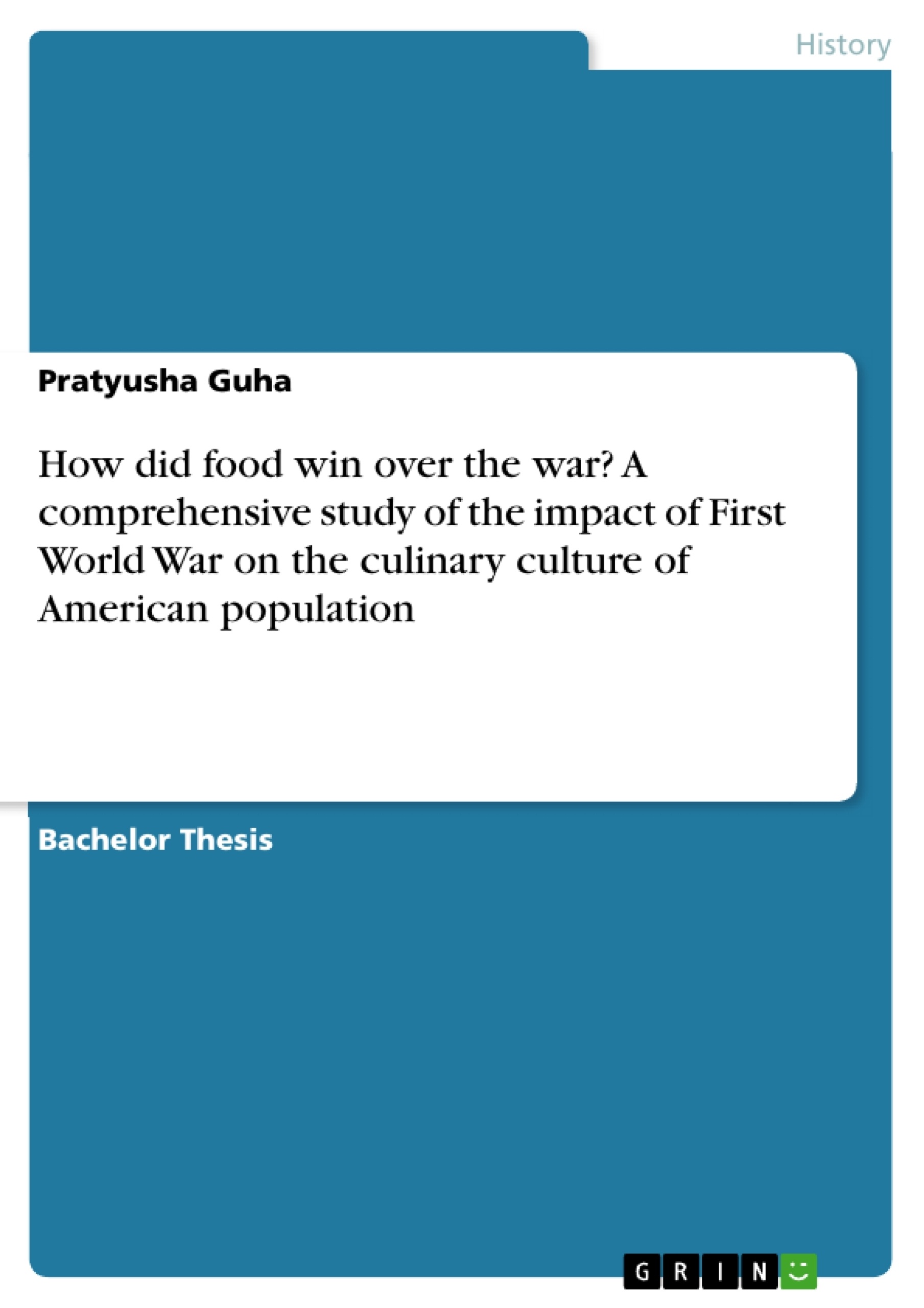
How did food win over the war? A comprehensive study of the impact of First World War on the culinary culture of American population
Bachelorarbeit, 2016
30 Seiten, Note: 9
Leseprobe
Inhaltsverzeichnis (Table of Contents)
- INTRODUCTION
- CHAPTER ONE. A brief of Commission for Relief in Belgium and a prelude to the 1917's Food Conservation.
- CHAPTER TWO. (In)Voluntary Food Conservation . .
- CHAPTER THREE. Cutting across races and forging of a cosmopolitan diet .
- CHAPTER FOUR. Thin body: a demarcator of patriotism (?) .
- EPILOGUE .
Zielsetzung und Themenschwerpunkte (Objectives and Key Themes)
This dissertation explores the impact of World War I on the culinary culture of the American population, focusing on the period between 1917 and the early 1920s. The study examines how the war-time food crisis and government-led conservation efforts transformed American food habits and contributed to the development of a more diverse and modern cuisine.
- The role of food conservation campaigns in shaping American food culture during World War I.
- The influence of scientific advancements in nutrition on food choices and dietary practices.
- The impact of the war on the acceptance and integration of immigrant foods into mainstream American cuisine.
- The connection between food, body image, and patriotism during the war.
- The evolution of American cuisine from a regional and traditional model to a more cosmopolitan and modern approach.
Zusammenfassung der Kapitel (Chapter Summaries)
Chapter One delves into the early years of the 20th century, highlighting the significant role of the Commission for Relief in Belgium in shaping American humanitarian efforts during World War I. It further explores how the war's political exigencies influenced food policies in America, setting the stage for the voluntary food conservation program of 1917. The chapter concludes with a discussion of Herbert Hoover's rise to prominence in the food conservation movement.
Chapter Two examines the role of propaganda in mobilizing the American population to support food conservation measures. The chapter explores instances of public resistance and analyzes why government efforts to promote food conservation were partially successful. It sheds light on the complexities of social and political dynamics during the war, highlighting the challenges faced in achieving widespread participation in food conservation efforts.
Chapter Three explores the triumph of nutritional science over the prevailing ideologies of Eugenics and Euthenics. It examines how the scientific understanding of food and nutrition challenged racial biases and led to the acceptance of a more diverse range of foods in American cuisine. The chapter emphasizes the shift from a racially-defined approach to food consumption to a more inclusive and cosmopolitan perspective.
Schlüsselwörter (Keywords)
This dissertation focuses on the intersection of food, war, and American culture. Key terms include World War I, food conservation, American cuisine, nutrition, Eugenics, Euthenics, cosmopolitan diet, immigrant foods, body image, and patriotism.
Frequently Asked Questions
How did World War I change American food habits?
The war forced food conservation and led to a shift from traditional regional diets to a more cosmopolitan and modern American cuisine.
What was the role of the United States Food Administration?
Established in 1917, it led propaganda and campaigns to encourage citizens to save food for soldiers and European allies.
How did nutritional science impact American diet during the war?
It challenged older racial ideologies (like Eugenics) and promoted the acceptance of diverse immigrant foods based on their nutritional value.
What was the "Commission for Relief in Belgium"?
It was an unprecedented humanitarian venture by the USA to distribute staple food to European allies before its own military involvement.
What is the link between body image and patriotism mentioned in the text?
During the war, a "thin body" was often viewed and promoted as a demarcator of patriotism and self-sacrifice for the nation.
Who was Herbert Hoover in this context?
Herbert Hoover rose to prominence as a leader in the food conservation movement during the World War I era.
Details
- Titel
- How did food win over the war? A comprehensive study of the impact of First World War on the culinary culture of American population
- Hochschule
- Presidency College, Kolkata
- Veranstaltung
- B.A HONORS HISTORY- DISSERTATION
- Note
- 9
- Autor
- Pratyusha Guha (Autor:in)
- Erscheinungsjahr
- 2016
- Seiten
- 30
- Katalognummer
- V337112
- ISBN (eBook)
- 9783656986959
- ISBN (Buch)
- 9783656986966
- Dateigröße
- 853 KB
- Sprache
- Englisch
- Schlagworte
- first world american
- Produktsicherheit
- GRIN Publishing GmbH
- Preis (Ebook)
- US$ 16,99
- Preis (Book)
- US$ 19,99
- Arbeit zitieren
- Pratyusha Guha (Autor:in), 2016, How did food win over the war? A comprehensive study of the impact of First World War on the culinary culture of American population, München, Page::Imprint:: GRINVerlagOHG, https://www.diplomarbeiten24.de/document/337112
- Autor werden
- Ihre Optionen
- Vertriebskanäle
- Premium Services
- Autorenprofil
- Textarten und Formate
- Services für Verlage, Hochschulen, Unternehmen

- © GRIN Publishing GmbH.
- Alle Inhalte urheberrechtlich geschützt. Kopieren und verbreiten untersagt.
- info@grin.com
- AGB
- Open Publishing
Der GRIN Verlag hat sich seit 1998 auf die Veröffentlichung akademischer eBooks und Bücher spezialisiert. Der GRIN Verlag steht damit als erstes Unternehmen für User Generated Quality Content. Die Verlagsseiten GRIN.com, Hausarbeiten.de und Diplomarbeiten24 bieten für Hochschullehrer, Absolventen und Studenten die ideale Plattform, wissenschaftliche Texte wie Hausarbeiten, Referate, Bachelorarbeiten, Masterarbeiten, Diplomarbeiten, Dissertationen und wissenschaftliche Aufsätze einem breiten Publikum zu präsentieren.
Kostenfreie Veröffentlichung: Hausarbeit, Bachelorarbeit, Diplomarbeit, Dissertation, Masterarbeit, Interpretation oder Referat jetzt veröffentlichen!
- GRIN Verlag GmbH
-
- Nymphenburger Str. 86
- 80636
- Munich, Deutschland
- +49 89-550559-0
- +49 89-550559-10
- info@grin.com
-









